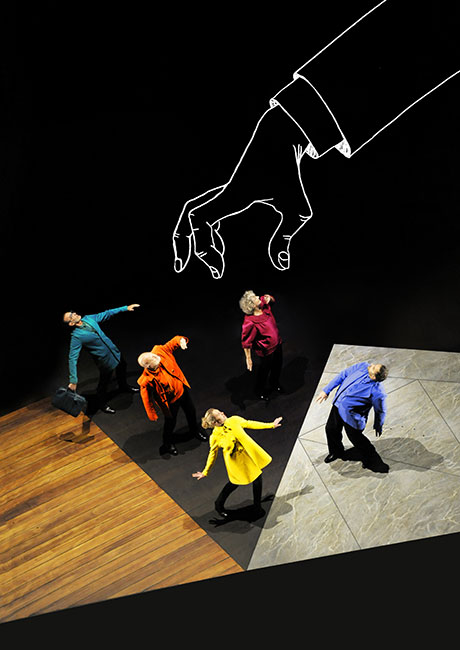Posted on January 25, 2017 in Arts & culture.
L'Avaleur: show at the Maison des Métallos from January 31 to February 18
With the Valor, Robin Renucci here takes this play by Jerry Sterner, satire of the hostile takeover process and the relationship between finance and industry. Text from Other People's Money by Jerry Sterner; directed by Robin Renucci with Nadine Darmon, Marilyne Fontaine, Xavier Gallais, Robin Renucci, Jean-Marie Winling.
 On the one hand, there is Franck Kafaim, “l'Avaleur”, trader in the City of London, genius in corporate buyouts, who has a furious appetite for life, power, money, everything. On the other hand, its target: a flourishing company, the “French Cable of Cherbourg”. The CEO and his assistant, older, gave their life to the company. They believe in the broadening of general well-being by industry, they love their profession, have fought to weather crises and are proud of it. The spectator is placed in front of these two camps, as in a boxing ring. Who will win the game?
On the one hand, there is Franck Kafaim, “l'Avaleur”, trader in the City of London, genius in corporate buyouts, who has a furious appetite for life, power, money, everything. On the other hand, its target: a flourishing company, the “French Cable of Cherbourg”. The CEO and his assistant, older, gave their life to the company. They believe in the broadening of general well-being by industry, they love their profession, have fought to weather crises and are proud of it. The spectator is placed in front of these two camps, as in a boxing ring. Who will win the game?
But beware, like the ogres of the tales, this swallower is attractive, jubilant even! Funny and removed, the staging, of a light rhythm punctuated by a battery on which the actors take turns, highlights our time. It is the end of the era of capitalism which is consumed, consumed ...
Is man still and always a wolf to man? The creation of L'Avaleur takes place within the framework of a cycle of meetings and creations around the notions of "work" and "wealth" initiated by the Tréteaux de France.
Staging
It is the context of the society in which we are, the system in which we live in our countries, which naturally led me to this room and led me not to have to explain reasons or find solutions, but to seek, in the first place, where evil comes from. We are faced with these questions posed in the 1840th century by the philosopher Thomas Hobbes with this observation: "In the state of nature, man is a wolf for man". After Le Faiseur and Balzac's foray into the world of the Paris Stock Exchange in the 2000s, I wanted to take a big step back in time with this Avaleur, this de-Faiseur, this destroyer of value that operates in the XNUMXs.
There is always a devoured and a devourer in the world offered to us as a model, that of capitalism, this world where personal profit often takes precedence over the collective and the social. It seemed interesting to me to stage a play that allows us to reflect on our time and glimpse the next. We are certainly at the end of a cycle and at the start of a new one, we feel it. Edgar Morin talks about moulting, metamorphosis. What world do we inherit? What mutation are we in? This is the very subject of Jerry Sterner's play. […]
[The character of the Valor] is attractive, he is pleasant, even jubilant, full of humor and vital energy. This is also one of the characteristics of our societies. Even within a destructive, deadly system, everything is done to make this operation attractive. The ogre is never hidden, never masked, on the contrary it appears, it appears as it is with cynicism, in its compulsion for food, its desire to engulf. He is attractive like the monsters in fairy tales. […]
It's a very funny piece, which must also, like Le Faiseur, make us shudder. It's really a comedy. The central character is an irresistible crook, able to turn over his jacket, and, after some apologies for the damage caused, able to obtain public support again and again. The problem is that the damage caused is not always repairable!
This dangerous impunity must be heard in humor, hoping to contribute to the awareness of spectators. That we cannot say: we did not know. It is a violent and comic subject, which makes the play a true modern tale. The ogre is both attractive and scary. It spends, it spends, it is oversized. We could summarize the play as follows: is the ogre going to crunch everyone?
In the original piece, the company is not located in New York but in the depths of America, in a formerly industrialized area. In the French adaptation, it will be based in Cherbourg to design the space of a port, and thereby promote an opening with the imagination of navigation, departures, the world of international trade. The second space, Wall Street in the original, will be located in London, in the City, in the heart of the high places of the transaction. Three spaces therefore: a modern space in London, Cherbourg with a window on the imagination, and a space of progress where the narrator comes to speak to the public, a timeless space in direct connection with the room. […]
Around the Avaleur, there is the old-fashioned entrepreneur: a captain who has led the business as a good father and who represents social capitalism. There is also a woman who is the woman of confidence, the assistant, rigorous, honest, representative of the personnel. And then another generation: the young woman, lawyer, at the school of power. She is seized with a kind of sexual arousal in the struggle against the maneuvers of the Avalor. Because it is also a man-woman struggle, a struggle of the sexes, a struggle of power to power. The young woman sees herself, sees herself, like a tamer.
The character of the narrator, whom I will play, is a character in empathy with the public, between the two camps, sharing his questions. He is trying to lose as few feathers as possible. A character who was anchored and who, in this great upheaval, willingly or by force, becomes floating and must redefine himself. Again, this is a very contemporary route.
The author has the frankness to show a combat, a combat of the man against the man. He was an entrepreneur, you can tell he watched all of this closely and he wrote a breathtaking, direct narrative theater. I believe that it will be joyful for the public to attend this fight today with the distance of laughter and storytelling.
Pratical information
House Steelworkers
94, rue jean-pierre timbaud, paris 11th
m ° Crowns or Parmentier
bus 96
- Tuesday 31 January> Saturday 18 February
- Tuesday to Friday at 20 p.m.
- Saturday at 19 p.m.
- Sunday at 16 p.m.
- duration 1h40
- from 13 years
Prices from 5 to 14 euros
booking: +01 47 00 25 20 XNUMX
www.maisondesmetallos.paris
Drawing Now Art Fair: Tatiana Wolska winner 2024
The invention of language by Gertrude Stein and Pablo Picasso
The history of French women's golf at Golf du Sorbier








